Articles & Chapters by Usha Natarajan
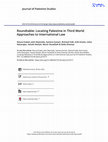
Journal of Palestine Studies, 2023
Noura Erakat, John Reynolds, Samera Esmeir, Richard Falk, Ardi Imseis, Usha Natarajan, Vasuki Nes... more Noura Erakat, John Reynolds, Samera Esmeir, Richard Falk, Ardi Imseis, Usha Natarajan, Vasuki Nesiah, Munir Nuseibah, and Diala Shamas.
The Zionist settler colonization of Palestine was, alongside apartheid in South Africa, one of the paradigmatic global issues that animated discussions among Global South anti-colonial scholars and leaders in the Bandung-Tricontinental era of the 1950s-1970s. While processes of formal decolonization have since played out across most of the Global South - notwithstanding the inequalities and violence of the postcolonial state and the neocolonial order - Palestine remains a quintessential site of ongoing settler colonialism and apartheid. This roundtable brings together scholars of Palestine and international law in discussion about the place of Palestine in Third World Approaches to International Law (TWAIL) scholarship. Among other queries, it asks: Where and how is Palestine present and absent in TWAIL scholarship? How has international law been complicit in histories and legacies of settler colonization? What role has the UN played in perpetuating the settler colonization of Palestine?
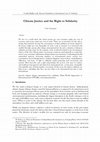
Cecilia Bailliet (ed), Research Handbook on International Law and Solidarity, 2023
We live in a world where the richest twenty per cent consumes eighty per cent of resources and cr... more We live in a world where the richest twenty per cent consumes eighty per cent of resources and creates ninety per cent of waste. There are no incentives for the rich to change their behavior because the consequences of their pollution are borne largely by the poorer eighty per cent. Inequality on such a scale is systemic; it is structured and enabled through, among other things, international law. In such a situation, working in solidarity provides hope for the majority of the world left behind by the development choices of the rich. Climate justice movements cooperate transnationally to compel the rich to cease economic exploitation and greenhouse gas emissions. Combatting powerful entrenched interests, increasing numbers of environmental justice activists face assassination, forced disappearance, retaliatory litigation, incarceration, criminalization, vilification, and more. A right to solidarity entails protecting such movements and activists. More than this, such a right acknowledges the need to cede space to cultures and traditions long ignored and silenced in international law, so that more sustainable and equitable ways of living together can emerge. In this sense, the right to solidarity can help create a discipline that does not just claim to be international but that is truly international.
Third World Approaches to International Law Review, 2020
Our purpose in creating the TWAIL Review is to provide a space for critical scholars, mainly from... more Our purpose in creating the TWAIL Review is to provide a space for critical scholars, mainly from the global South and their allies oriented to the South, to participate in the project of international law, to produce knowledge creatively through interdisciplinarity, and to push our discipline towards becoming more just, more radical, and more responsive to the collective challenges we face.
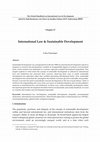
The Oxford Handbook on International Law & Development, 2023
Sustainable development was conceptualized in the late 1980s by international development experts... more Sustainable development was conceptualized in the late 1980s by international development experts in response to concerns that development wreaked an insupportable degree of systemic environmental harm, which needed to be addressed in a manner cognizant of global development inequalities. This chapter explores to what extent the concept of sustainable development as utilized by international laws and institutions has answered these concerns, observing three ways in which sustainable development has replicated rather than rectified preexisting development harms. First, sustainable development has entrenched the assumption that infinite economic growth is desirable and possible. Second, it services the need to periodically reinvent development in the face of past failures. Third, it reinforces the longstanding turn away from root causes of underdevelopment and towards palliative measures in international law and institutions. In these ways, while sustainable development makes the important point that development should be both environmentally and socially beneficial, it is used in a manner that renders such development impossible.
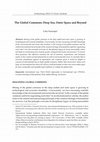
Ocean Yearbook, 2023
Mining of the global commons in the deep seabed and outer space is growing in technological and e... more Mining of the global commons in the deep seabed and outer space is growing in technological and economic feasibility. Concurrently, we have increasing scientific knowledge of the environmental and social risks involved. Is the concept of the global commons and the related international law principle of the common heritage of humankind useful for negotiating such risks? Can this principle overcome its disciplinary legacy of strong mercantilist values and make an evolutionary turn towards greater ecological and social consciousness? To answer these questions, this reflection examines the role of commons, corporations, and European empire in the creation of international law as well as environmental crises. It concludes that to overcome disciplinary legacies of imperialism and corporate greed it would be helpful to conceive of international law as itself a global commons. Rather than Eurocentric values writ large, an international law where all cultures could participate on their own terms makes space for more sustainable and equitable legal traditions to reshape the global order.
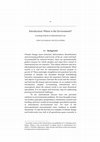
Locating Nature: Making and Unmaking International Law, 2022
Climate change, mass extinction, deforestation, desertification, and increasing pollution and tox... more Climate change, mass extinction, deforestation, desertification, and increasing pollution and toxicity of the air, water, and land: Uncontainable by national borders, these are quintessentially global concerns for which peoples and states have turned to international law for solutions. This edited collection asks how international lawyers have understood the environment: What exactly is it and how do international lawyers purport to govern it? These seemingly straightforward questions have the potential to unmake our discipline through destabilizing formative assumptions about the separation between subjects and objects of governance, between the social and the natural, and between the human and non-human. We explain in this introductory chapter that reexamining international law assumptions about the natural world is not mere theoretical speculation. It is an urgent and necessary step for addressing pressing environmental challenges.
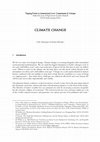
Tipping Points in International Law: Commitment & Critique, edited by Jean d’Aspremont & John Haskell, 2021
We are witnessing environmental change unseen in millions of years: the sixth mass extinction of ... more We are witnessing environmental change unseen in millions of years: the sixth mass extinction of species, the changing climate, the dying oceans and dwindling forests, the spreading deserts, increasing toxicity of water, air and soil, and the complex interrelatedness between these phenomena. This chapter focuses particularly on climate change and its relationship with international law. Anthropogenic climate change is in many ways a problem ideally-suited to an international law solution. It is caused by fossil fuel-driven industrialization, which emits greenhouse gases and warms our atmosphere. Most emissions come from rich industrial and post-industrial states, but the impact is experienced everywhere. Caused by a small number of rich people, but impacting the poor masses, climate change raises global justice issues that can only be addressed through international cooperation. International climate law began in 1992, aiming to reduce emissions, adapt to any unpreventable change, and take into account fairness and global inequalities of power and wealth. Unfortunately, in the last three decades, the problem has exponentially worsened.
This chapter argues that international climate law has not only been ineffective but has in some ways made things worse. Climate change demands more than the proliferation of new legal specializations and expertise. Rather, it fundamentally unravels the foundations of our discipline, revealing mistaken disciplinary assumptions about development, progress, and order. The implications of climate change transcend international law, challenging knowledge production in the social sciences more generally. Disciplines that are built on the assumption that natural systems are stable – such as law, economics, political science, and so on – no longer function when natural systems are destabilized. An adequate disciplinary response requires, first, understanding how international law contributed to this instability; and second, reshaping the fundamental building blocks of international law – concepts such as sovereignty, jurisdiction, territory, development, human rights, and so on – in a more sustainable vein. Climate change and the other types of environmental degradation multiplying today evidence that ecology gives birth to law, rather than the other way around. Revelatory of our longstanding disciplinary hubris, climate change is not only the product of our inability as lawyers to understand or govern nature, but it also shows us that it has always been the other way around: it is nature that creates and sustains us.
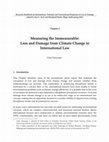
Research Handbook on International, National, and Transnational Responses to Loss & Damage, edited by Sara L Seck & M Doelle, 2021
This chapter identifies six assumptions about nature that underpin the conception of loss and dam... more This chapter identifies six assumptions about nature that underpin the conception of loss and damage from climate change and assesses whether they are accurate. The first four assumptions about nature are that loss and damage arising from climate change is a) identifiable, b) calculable, c) compensable, and d) attributable. The final two assumptions (which seem, at least at first glance, not to do with nature but with justice) are: e) the concept of loss and damage for climate change may help deter irresponsible behavior, and f) the concept makes a much-needed gesture towards fairness. These final two assumptions remain pertinent even if loss and damage from climate change is not identifiable, calculable, compensable, or attributable.
Upon examination, this chapter concludes that ultimately all six assumptions reduce nature to its commodification and exchange value, thus reproducing our discipline’s harmful relationship with the natural environment. For this reason, there are risks that international laws on climate loss and damage may have unintended consequences, including that of potentially exacerbating climate change. These risks should be taken seriously and addressed because they echo existing patterns in international environmental and climate law.
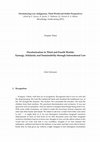
Decolonizing Law: Indigenous, Third World and Settler Perspectives, edited by S Xavier, B Jacobs, V Waboose, JG Hewitt & A Bhatia, 2021
This chapter considers synergies and dissonances between Third World and Indigenous (sometimes ca... more This chapter considers synergies and dissonances between Third World and Indigenous (sometimes called Fourth World) approaches to international law. It examines how states and peoples of the global South have destroyed Indigenous and Tribal sovereignty and how postcolonial and antiracist movements participate in reproducing such erasure. It argues that TWAIL should instead align in solidarity with the decolonization demands of Indigenous and Tribal peoples. Such support is central to our anticolonial mandate. It necessitates a type of self-awareness that is indispensable to achieving TWAIL’s anti-imperial goals. The chapter concludes by examining what the stakes of achieving such synergy and solidarity are at a time of multiplying environmental crises.
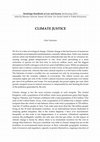
Routledge Handbook of Law & Society, edited by Mariana Valverde, Kamari M Clarke, Eve Darian Smith & Prabha Kotiswaran, 2021
We live in a time of ecological change. Climate change is the best known of numerous interrelated... more We live in a time of ecological change. Climate change is the best known of numerous interrelated environmental transformations currently taking place. Each year, human activity emits one hundred times as much carbon dioxide into the air as volcanoes do, causing average global temperatures to rise. Even more perturbing is a mass extinction of species for the first time in sixty-six million years, and the biggest disruption to Earth’s nitrogen cycle in two and a half billion years. While our planetary history does evidence cyclical recurrence of such events, in the past nature played the dominant causal role, whereas this time colossal injustice is at the heart of the matter. The lifestyles of today’s wealthy few are sustained not only by increasing economic inequality but the systemic collapse of ecosystems. The richest twenty per cent consumes eighty per cent of the world’s natural resources and generates over ninety per cent of its pollution and waste. For most people, the poorer eighty per cent, their grossly unequal access to natural resources is compounded by also bearing the brunt of the pollution generated by the rich.
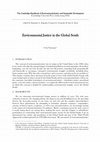
The Cambridge Handbook of Environmental Justice and Sustainable Development, edited by SA Atapattu, CG Gonzalez & SL Seck, 2021
We are witnessing environmental change unseen in millions of years: The sixth mass extinction of ... more We are witnessing environmental change unseen in millions of years: The sixth mass extinction of species, the changing climate, the dying oceans and dwindling forests, the spreading deserts, the increasing toxicity of our water, air and soil, and the complex interrelatedness between these phenomena. In attempting to formulate adequate responses, communities, activists, technical experts, academics, as well as law and policymakers, are increasingly turning to the notion of environmental justice for guidance. Before examining reasons for such a turn, it is worth stating that I am among those making this move, and this Chapter is self-reflexive participation in constructing what environmental justice means for the Global South. I am an international law scholar and practitioner in the Global South and part of the Third World Approaches to International Law (TWAIL) movement. My assessment of environmental justice is colored by my location, profession, and politics. I judge the utility of environmental justice against the backdrop of how effective international law has heretofore been for addressing the environmental concerns of the Global South.
The concept of environmental justice has its origins in the United States in the 1980s when it was used to describe the unequal impact of industrial pollution on racial minorities. From these beginnings, over the last four decades the idea has blossomed, expanding both geographically and historically to encompass variegated environmental struggles worldwide, including those from centuries past. Why does this concept have such resonance and wherein lies its usefulness? This chapter examines these questions from the point of view of the Global South. I begin with some background on what is meant by the Global South and by environmental justice. I then use the customary four-pillar formulation of environmental justice – distributive justice, procedural justice, corrective justice, and social justice – to explain the different theoretical and practical ways in which this concept is helpful for understanding environmental struggles across the Global South.
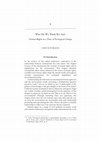
Locating Nature: Making and Unmaking International Law, 2022
This chapter explores the relationship between human rights and the environment. It begins by ask... more This chapter explores the relationship between human rights and the environment. It begins by asking ‘who we think we are’ to understand the forms of subjecthood and subjectivity produced by human rights. It argues that human rights normalize a series of false conceptions about our collective self that have detrimental social and ecological consequences. The chapter next examines the question of ‘where we think we are’, probing the ontological rift between humans as subjects of rights and ‘the environment’ as the repository of resources with which to satisfy human entitlements. The chapter challenges human rights as a hubristic organizing category and observes that the ‘who’ and ‘where’ questions, artificially separated in the chapter, serve to show that the way humans treat each other is inextricable from the way we treat nature. To undo relationships of mastery, ownership, and violence between the subjects and objects of human rights law, projects for human wellbeing and environmental struggles need to engage with and understand each other outside the unproductive rubric of rights discourse.

Invisible Institutionalisms: Collective Reflections on the Shadows of Legal Globalization, edited by SS Ballakrishnan & S Dezalay, 2021
Palacios analogizes Latin American competition law with Márquez’s famous Macondo, a town of mirro... more Palacios analogizes Latin American competition law with Márquez’s famous Macondo, a town of mirrors destined to become a city of mirages. After a century of emulating Western legal regimes, competition laws in Mexico, Chile, and Colombia have become illusory: laws are untethered from their purposes, outcomes mismatched with goals. As an international lawyer coming from a postcolonial milieu and working in the Global South, I found Palacios’ tale compelling while also possessing an undercurrent of the predictable. There is a sense of inevitability that accompanies postcolonial legal failure. Palacios acknowledges an underlying fatalism that ‘we will never be as good as the West’.
Coming from a law and development background, I developed an early and close acquaintance with this fatalism and the challenges of sublimating it. I am part of a movement called TWAIL (Third World Approaches to International Law) that demands an international law that is responsive to the diverse needs of peoples across the Global South, a discipline more truly international. Our aims are not new: we build on the legacy of Third World international lawyers that have struggled for the same since the advent of the postcolonial state. While we stand on their shoulders, the strategies of the past had some pitfalls that are also our inheritance. With this personal history, perhaps it is unsurprising that I read the shortcomings in Latin American competition law as symptomatic of the broader law and development failures of the postcolonial state. Underpinning postcolonial fatalism is the deeper problem of fetishism: devotion to the Western development model despite repeated disappointment.
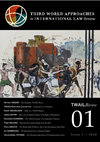
Third World Approaches to International Law Review, 2020
We launch the first issue of the Third World Approaches to International Law Review (TWAILR) in t... more We launch the first issue of the Third World Approaches to International Law Review (TWAILR) in the throes of a global pandemic, transnational uprisings demanding racial and socioeconomic justice, a determined worldwide campaign against sexual assault, sexual harassment and patriarchy, and a growing international climate justice movement. At such a time, Third World Approaches to International Law, commonly known as TWAIL, are more important than ever. TWAIL understands each of these challenges not as unforeseen emergencies, but as a long time in the making, and the inevitable result of international law structures of violence against nature, women, racialized peoples, queer peoples, and Indigenous peoples. While international law is, of course, not the only reason such problems exist, TWAIL draws attention to how injustice is enabled and structured through law and its institutions, not only in local and domestic arenas but transnationally and globally. Through identifying the legacies of colonialism, genocide, slavery, apartheid, and the ongoing racial, class, gender, and sexual discrimination within contemporary international law, TWAIL problematizes and breaks down conventional disciplinary distinctions between the national and the international, the public and the private, and the legal and the political. Through broadening our analytical scope in both time and space, TWAIL helps guard against reactive responses and crisis-based thinking, so as to more accurately identify and combat global injustice.

Bandung, Global History, and International Law: Critical Pasts and Pending Futures, edited by L Eslava, M Fakhri & V Nesiah, 2017
In this chapter, we consider whether, by wholeheartedly embracing sovereignty and the pursuit of ... more In this chapter, we consider whether, by wholeheartedly embracing sovereignty and the pursuit of development in the Western sense, the Third World has (1) lost the ability to imagine sustainable and equitable economic alternatives; (2) splintered its solidarity through exacerbating economic and environmental inequality and injustice in the Third World; and (3) how the environmental challenge is transforming the Third World in fundamental ways, in terms of its meaning and place, as well as its strategies in responding to the intertwined conundrums of economic and environmental injustice.
We do this through a dialogue that revisits Mickelson’s observations in her 1998 article, 'Rhetoric and Rage: Third World Voices in International Legal Discourse', which remains one of the most cited on the Third World and international law. This article provides a particularly apposite means for reflecting together on the legacies of Bandung for the environment because it traces the evolution of postcolonial solidarity in the aftermath of the influential Bandung meeting, identifying the emergence of distinctive Third World approaches to international law in the fields of economics, human rights, and the environment through close analyses of Third World scholarly texts.

Research Methods in Environmental Law: A Handbook, edited by Andreas Philippopoulos-Mihalopoulos & Victoria Brooks, 2017
The natural environment and its governance through law have a long history in the global South. A... more The natural environment and its governance through law have a long history in the global South. As in the global North, nature has been regulated since ancient times through complex plural regimes of sovereign, religious, customary and tribal laws, and in more recent times colonial, state, regional, transnational and international laws. This chapter specifically examines how international lawyers that are part of the Third World Approaches to International Law (TWAIL) movement have approached environmental issues and international environmental law. As I am part of this movement and have focused on the environment in recent years, this chapter is a self-reflective critique on a subject of increasing interest within TWAIL. Section 2 introduces TWAIL and explains our continued usage of the term Third World despite allegations of its being anachronistic. Section 3 examines TWAIL and the environment through division into three phases: first, the period following independence, particularly the 1960s and 1970s, where Third World international lawyers prioritized natural resource governance; second, the inauguration of the acronym TWAIL in the 1990s and a movement that remained largely skeptical of and disengaged from international environmental law; and third, the contemporary moment with the resurgence of interest in the environment within TWAIL.
Windsor Year Book of Access to Justice , 2016
This Special Issue unites articles from the Third World Approaches to International Law (TWAIL) C... more This Special Issue unites articles from the Third World Approaches to International Law (TWAIL) Cairo Conference (21-24 Feb 2015). TWAIL is a network of international lawyers that seeks to unpack the colonial legacies of international law and decolonize the material realities of the peoples of the global South. The Cairo Conference was the first time that TWAIL convened in the global South. The conference theme, 'On Praxis and the Intellectual', asks: What is the role of the intellectual in political life? What is the relationship between our scholarly endeavors and social structures; whether preserving the status quo, shaping reform, or radical change? This editors' introduction considers the place of praxis and the praxis of place, and the challenges of individual and collective self-reflection in a particular times and spaces.
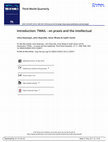
Third World Quarterly, 2016
This Special Issue emerges from the Third World Approaches to International Law (TWAIL) Cairo Con... more This Special Issue emerges from the Third World Approaches to International Law (TWAIL) Cairo Conference in 2015 and addresses the conference theme, ‘On Praxis and the Intellectual’, by focusing on different aspects of the intellectual as a political actor. In introducing this Issue, we provide some background to the TWAIL network, movement, event, and publications; and delineate our own understandings of scholarly praxis as editors and conference organizers. Broadly, we understand praxis as the relationship between what we say as scholars and what we do – as the inextricability of theory from lived experience. Understood in this way, praxis is central to TWAIL, as TWAIL scholars strive to reconcile international law’s promise of justice with the proliferation of injustice in the world it purports to govern. Reconciliation occurs in the realm of praxis and TWAIL scholars engage in a variety of struggles, including those for greater self-awareness, disciplinary upheaval, and institutional resistance and transformation.
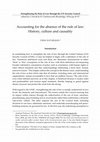
Strengthening the Rule of Law through the UN Security Council, edited by J Farrall & H Charlesworth , 2016
The UN Security Council (UNSC) could be urged to construe its own mandate as narrowly as possible... more The UN Security Council (UNSC) could be urged to construe its own mandate as narrowly as possible in its own interests, so that it will be perceived as fairer and more legitimate. Such a perception would be a powerful tool in service of the UNSC’s ultimate purpose of keeping the global peace. But self-rule is not the rule of law (ROL). In any case, the UNSC, its extraordinary powers and its undemocratic character, are themselves creatures of international law. Therefore, it is of limited usefulness to frame inconsistent UNSC action as a rule-of-law problem. It is rather a question of legal preferences, and whether different international laws would bring us nearer to equal treatment than the current arrangement.
To illustrate the two aforementioned points, the first part of this chapter examines attempts to assess and promote the ROL domestically, looking at some recent developments in Tunisia and Egypt and arguing that the reasons for movement towards or away from a rule-of-law culture are not entirely confined to either the domestic or the legal realm. Consequently, tinkering in those realms alone cannot produce such a culture. The second part considers the ROL in the international context through the case of Iraq, arguing that it is not an absence of law, legal institutions or law reform that allows powerful states to operate as they wish. Rather, it is the proliferation of specific types of laws, institutions and reforms that create and maintain unequal international relations. The analyses in the first and second sections together illustrate that the ROL in the domestic and international realms is intimately connected, and assessing both side-by-side allows for a fuller understanding of the manifold operations of rule-of-law discourse. The Arab region is particularly helpful for such an examination, as a region dominated by authoritarian regimes governing without the ROL, as well as the subject of long-standing attention from the UNSC and other international bodies.

Leiden Journal of International Law, 2014
Environmental harm is of increasing concern to peoples and states all over the world, whether in ... more Environmental harm is of increasing concern to peoples and states all over the world, whether in relation to ensuring access to healthy air, water, food, and sustainable livelihoods, or coping with the diversity of challenges posed by changing climates and ecologies. While international lawyers have focused on crafting solutions to environmental problems, less attention is paid to the disciplinary role in fostering harmful and unsustainable behavioral patterns. Environmental issues are usually relegated to the specialized field of international environmental law. This project explores instead the role of nature in the general discipline, arguing that the natural environment is a determinative factor in shaping international law, and that assumptions about nature lie at the heart of disciplinary concepts such as sovereignty, development, economy, property, and human rights.
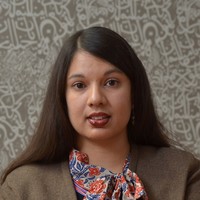
Uploads
Articles & Chapters by Usha Natarajan
The Zionist settler colonization of Palestine was, alongside apartheid in South Africa, one of the paradigmatic global issues that animated discussions among Global South anti-colonial scholars and leaders in the Bandung-Tricontinental era of the 1950s-1970s. While processes of formal decolonization have since played out across most of the Global South - notwithstanding the inequalities and violence of the postcolonial state and the neocolonial order - Palestine remains a quintessential site of ongoing settler colonialism and apartheid. This roundtable brings together scholars of Palestine and international law in discussion about the place of Palestine in Third World Approaches to International Law (TWAIL) scholarship. Among other queries, it asks: Where and how is Palestine present and absent in TWAIL scholarship? How has international law been complicit in histories and legacies of settler colonization? What role has the UN played in perpetuating the settler colonization of Palestine?
This chapter argues that international climate law has not only been ineffective but has in some ways made things worse. Climate change demands more than the proliferation of new legal specializations and expertise. Rather, it fundamentally unravels the foundations of our discipline, revealing mistaken disciplinary assumptions about development, progress, and order. The implications of climate change transcend international law, challenging knowledge production in the social sciences more generally. Disciplines that are built on the assumption that natural systems are stable – such as law, economics, political science, and so on – no longer function when natural systems are destabilized. An adequate disciplinary response requires, first, understanding how international law contributed to this instability; and second, reshaping the fundamental building blocks of international law – concepts such as sovereignty, jurisdiction, territory, development, human rights, and so on – in a more sustainable vein. Climate change and the other types of environmental degradation multiplying today evidence that ecology gives birth to law, rather than the other way around. Revelatory of our longstanding disciplinary hubris, climate change is not only the product of our inability as lawyers to understand or govern nature, but it also shows us that it has always been the other way around: it is nature that creates and sustains us.
Upon examination, this chapter concludes that ultimately all six assumptions reduce nature to its commodification and exchange value, thus reproducing our discipline’s harmful relationship with the natural environment. For this reason, there are risks that international laws on climate loss and damage may have unintended consequences, including that of potentially exacerbating climate change. These risks should be taken seriously and addressed because they echo existing patterns in international environmental and climate law.
The concept of environmental justice has its origins in the United States in the 1980s when it was used to describe the unequal impact of industrial pollution on racial minorities. From these beginnings, over the last four decades the idea has blossomed, expanding both geographically and historically to encompass variegated environmental struggles worldwide, including those from centuries past. Why does this concept have such resonance and wherein lies its usefulness? This chapter examines these questions from the point of view of the Global South. I begin with some background on what is meant by the Global South and by environmental justice. I then use the customary four-pillar formulation of environmental justice – distributive justice, procedural justice, corrective justice, and social justice – to explain the different theoretical and practical ways in which this concept is helpful for understanding environmental struggles across the Global South.
Coming from a law and development background, I developed an early and close acquaintance with this fatalism and the challenges of sublimating it. I am part of a movement called TWAIL (Third World Approaches to International Law) that demands an international law that is responsive to the diverse needs of peoples across the Global South, a discipline more truly international. Our aims are not new: we build on the legacy of Third World international lawyers that have struggled for the same since the advent of the postcolonial state. While we stand on their shoulders, the strategies of the past had some pitfalls that are also our inheritance. With this personal history, perhaps it is unsurprising that I read the shortcomings in Latin American competition law as symptomatic of the broader law and development failures of the postcolonial state. Underpinning postcolonial fatalism is the deeper problem of fetishism: devotion to the Western development model despite repeated disappointment.
We do this through a dialogue that revisits Mickelson’s observations in her 1998 article, 'Rhetoric and Rage: Third World Voices in International Legal Discourse', which remains one of the most cited on the Third World and international law. This article provides a particularly apposite means for reflecting together on the legacies of Bandung for the environment because it traces the evolution of postcolonial solidarity in the aftermath of the influential Bandung meeting, identifying the emergence of distinctive Third World approaches to international law in the fields of economics, human rights, and the environment through close analyses of Third World scholarly texts.
To illustrate the two aforementioned points, the first part of this chapter examines attempts to assess and promote the ROL domestically, looking at some recent developments in Tunisia and Egypt and arguing that the reasons for movement towards or away from a rule-of-law culture are not entirely confined to either the domestic or the legal realm. Consequently, tinkering in those realms alone cannot produce such a culture. The second part considers the ROL in the international context through the case of Iraq, arguing that it is not an absence of law, legal institutions or law reform that allows powerful states to operate as they wish. Rather, it is the proliferation of specific types of laws, institutions and reforms that create and maintain unequal international relations. The analyses in the first and second sections together illustrate that the ROL in the domestic and international realms is intimately connected, and assessing both side-by-side allows for a fuller understanding of the manifold operations of rule-of-law discourse. The Arab region is particularly helpful for such an examination, as a region dominated by authoritarian regimes governing without the ROL, as well as the subject of long-standing attention from the UNSC and other international bodies.
The Zionist settler colonization of Palestine was, alongside apartheid in South Africa, one of the paradigmatic global issues that animated discussions among Global South anti-colonial scholars and leaders in the Bandung-Tricontinental era of the 1950s-1970s. While processes of formal decolonization have since played out across most of the Global South - notwithstanding the inequalities and violence of the postcolonial state and the neocolonial order - Palestine remains a quintessential site of ongoing settler colonialism and apartheid. This roundtable brings together scholars of Palestine and international law in discussion about the place of Palestine in Third World Approaches to International Law (TWAIL) scholarship. Among other queries, it asks: Where and how is Palestine present and absent in TWAIL scholarship? How has international law been complicit in histories and legacies of settler colonization? What role has the UN played in perpetuating the settler colonization of Palestine?
This chapter argues that international climate law has not only been ineffective but has in some ways made things worse. Climate change demands more than the proliferation of new legal specializations and expertise. Rather, it fundamentally unravels the foundations of our discipline, revealing mistaken disciplinary assumptions about development, progress, and order. The implications of climate change transcend international law, challenging knowledge production in the social sciences more generally. Disciplines that are built on the assumption that natural systems are stable – such as law, economics, political science, and so on – no longer function when natural systems are destabilized. An adequate disciplinary response requires, first, understanding how international law contributed to this instability; and second, reshaping the fundamental building blocks of international law – concepts such as sovereignty, jurisdiction, territory, development, human rights, and so on – in a more sustainable vein. Climate change and the other types of environmental degradation multiplying today evidence that ecology gives birth to law, rather than the other way around. Revelatory of our longstanding disciplinary hubris, climate change is not only the product of our inability as lawyers to understand or govern nature, but it also shows us that it has always been the other way around: it is nature that creates and sustains us.
Upon examination, this chapter concludes that ultimately all six assumptions reduce nature to its commodification and exchange value, thus reproducing our discipline’s harmful relationship with the natural environment. For this reason, there are risks that international laws on climate loss and damage may have unintended consequences, including that of potentially exacerbating climate change. These risks should be taken seriously and addressed because they echo existing patterns in international environmental and climate law.
The concept of environmental justice has its origins in the United States in the 1980s when it was used to describe the unequal impact of industrial pollution on racial minorities. From these beginnings, over the last four decades the idea has blossomed, expanding both geographically and historically to encompass variegated environmental struggles worldwide, including those from centuries past. Why does this concept have such resonance and wherein lies its usefulness? This chapter examines these questions from the point of view of the Global South. I begin with some background on what is meant by the Global South and by environmental justice. I then use the customary four-pillar formulation of environmental justice – distributive justice, procedural justice, corrective justice, and social justice – to explain the different theoretical and practical ways in which this concept is helpful for understanding environmental struggles across the Global South.
Coming from a law and development background, I developed an early and close acquaintance with this fatalism and the challenges of sublimating it. I am part of a movement called TWAIL (Third World Approaches to International Law) that demands an international law that is responsive to the diverse needs of peoples across the Global South, a discipline more truly international. Our aims are not new: we build on the legacy of Third World international lawyers that have struggled for the same since the advent of the postcolonial state. While we stand on their shoulders, the strategies of the past had some pitfalls that are also our inheritance. With this personal history, perhaps it is unsurprising that I read the shortcomings in Latin American competition law as symptomatic of the broader law and development failures of the postcolonial state. Underpinning postcolonial fatalism is the deeper problem of fetishism: devotion to the Western development model despite repeated disappointment.
We do this through a dialogue that revisits Mickelson’s observations in her 1998 article, 'Rhetoric and Rage: Third World Voices in International Legal Discourse', which remains one of the most cited on the Third World and international law. This article provides a particularly apposite means for reflecting together on the legacies of Bandung for the environment because it traces the evolution of postcolonial solidarity in the aftermath of the influential Bandung meeting, identifying the emergence of distinctive Third World approaches to international law in the fields of economics, human rights, and the environment through close analyses of Third World scholarly texts.
To illustrate the two aforementioned points, the first part of this chapter examines attempts to assess and promote the ROL domestically, looking at some recent developments in Tunisia and Egypt and arguing that the reasons for movement towards or away from a rule-of-law culture are not entirely confined to either the domestic or the legal realm. Consequently, tinkering in those realms alone cannot produce such a culture. The second part considers the ROL in the international context through the case of Iraq, arguing that it is not an absence of law, legal institutions or law reform that allows powerful states to operate as they wish. Rather, it is the proliferation of specific types of laws, institutions and reforms that create and maintain unequal international relations. The analyses in the first and second sections together illustrate that the ROL in the domestic and international realms is intimately connected, and assessing both side-by-side allows for a fuller understanding of the manifold operations of rule-of-law discourse. The Arab region is particularly helpful for such an examination, as a region dominated by authoritarian regimes governing without the ROL, as well as the subject of long-standing attention from the UNSC and other international bodies.
While the critical study of anthropocentrism has been under way for several years, it has either focused on specific subfields of international law or emanated from two distinctive strands inspired by the animal rights movement and deep ecology. This handbook offers a broader study of anthropocentrism in international law as a global legal system and academic field. It assesses the extent to which current international law is anthropocentric, contextualises that claim in relation to broader critical theories of anthropocentrism, and explores alternative ways for international law to organise relations between humans and other living and non-living entities.
This book will interest international lawyers, environmental lawyers, legal theorists, social theorists, and those concerned with the philosophy and ethics of ecology and the non-human realms.
For those troubled by environmental harm on a global scale and its deeply unequal effects, this book explains how international law structures ecological degradation and environmental injustice while claiming to protect the environment. It identifies how central legal concepts such as sovereignty, jurisdiction, territory, development, environment, labour and human rights make inaccurate and unsustainable assumptions about the natural world and systemically reproduce environmental degradation and injustice. To avert socioecological crises, we must not only unpack but radically rework our understandings of nature and its relationship with law. We propose more sustainable and equitable ways to remake law's relationship with nature by drawing on diverse disciplines and sociocultural traditions that have been marginalized within international law. Influenced by Third World Approaches to International Law (TWAIL), postcolonialism and decoloniality, and inspired by Indigenous knowledges, cosmology, mythology and storytelling, this book lays the groundwork for an epistemological shift in the way humans conceptualize the relationship between law and nature.
REVIEWS:
‘Against the backdrop of the intensifying and life-threatening ecological crisis, this pathbreaking volume seeks to challenge and reconfigure the assumptions that inform international law. Among other things, it underscores the need to reform global capitalism with its focus on commodification and subordination of nature. A must-read volume for all students of international law.'
B. S. Chimni - Distinguished Professor of International Law, O. P. Jindal Global University
‘This collection of essays on nature brings an imaginative and original dimension to debates about the future of international law. The authors uncover the impoverished concepts of nature that underpin fields such as international environmental law, international trade law, international development, sovereignty and territory. They argue, in many different ways, that ideas about nature are deeply connected with inequality. While sombre in its diagnosis, the book is also hopeful in identifying pathways for change.'
Judge Hilary Charlesworth - International Court of Justice; Harrison Moore Professor of Law and Melbourne Laureate Professor, Melbourne Law School; Distinguished Professor, Australian National University
‘This is an outstanding book. By ‘locating nature' in international law, by placing what we now term ‘environmental issues' in the broader context of a history of international law, the authors illuminate in new ways the relationships among the environment and key issues and concepts of international law, including sovereignty, political economy, territory and jurisdiction. This book achieves a coherence and cumulative power rare in edited volumes, and will compel a rethinking of the relationship between nature and international law.'
Antony Anghie - Professor of Law, National University of Singapore and University of Utah
‘A clear and persuasive explanation of how environmental issues are the responsibility of all international lawyers, this book leads those unfamiliar with these issues to appreciate and engage with the role of the environment in their work. It uncovers harmful assumptions about nature in foundational disciplinary concepts and demands change through democratisation of the discipline, so that sustainable societies in the Global South can play a greater role in international law making. This thought-provoking collaboration is a call for disciplinary solidarity and unity to work together toward sustainable solutions for people and planet.'
Obiora Chinedu Okafor - Edward B. Burling Chair in International Law and Institutions at Johns Hopkins School of Advanced International Studies; United Nations Independent Expert on Human Rights and International Solidarity
‘This timely edited collection exposes why and how – in the midst of rapidly intensifying environmental pressures – international law (including international environmental law) continues to peer myopically into the ‘reality tunnel' that caused them in the first place. Not content to stop at a compelling critique of international law's eco-destructive assumptions, the collection also offers a plausible, powerful international legal counter-narrative fit for the challenges of the age.'
Anna Grear - Professor of Law, Cardiff University; Editor in Chief, Journal of Human Rights and the Environment
‘This tour de force captures the theoretical and practical challenges for all of international law to understand our relationship with nature better. This book is a thorough collection that will push international lawyers in all fields in new and necessary directions.'
Michael Fakhri - Professor of Law, University of Oregon; United Nations Special Rapporteur on the Right to Food
TABLE OF CONTENTS:
FOREWORD
Carmen G. Gonzalez
INTRODUCTION: WHERE IS THE ENVIRONMENT? LOCATING NATURE IN INTERNATIONAL LAW
Usha Natarajan and Julia Dehm
PART I LOCATING NATURE IN INTERNATIONAL LAW: TOWARDS NEW THINKING
1 Locating Nature: Making and Unmaking International Law
Usha Natarajan and Kishan Khoday
2 From Classical Liberalism to Neoliberalism: Explaining the Contradictions in the International Environmental Law Project
Hélène Mayrand
3 Reconfiguring Environmental Governance in the Green Economy: Extraction, Stewardship and Natural Capital
Julia Dehm
PART II UNMAKING INTERNATIONAL LAW
4 Appropriating Nature: Commerce, Property and the Commodification of Nature in the Law of Nations
Ileana Porras
5 Reflections on a Political Ecology of Sovereignty: Engaging International Law and ‘the Map’
Tyler McCreary and Vanessa Lamb
6 The Maps of International Law: Perceptions of Nature in the Classification of Territory beyond the State
Karin Mickelson
7 Denaturalising the Concept of Territory in International Law
Cait Storr
8 Who Do We Think We Are? Human Rights in a Time of Ecological Change
Usha Natarajan
9 Law, Labour and Landscape in a Just Transition
Adrian A. Smith and Dayna Nadine Scott
PART III ALTERNATIVES AND REMAKINGS
10 Three Enclosures of International Law: Commoning Premises, Processes and Aims
Darina Petrova and Tomaso Ferrando
11 The Mythic Environment: Ecocosmology and Narrative Remakings of Environmental Consciousness
Kishan Khoday
12 Law and Politics of the Human/Nature: Exploring the Foundations and Institutions of the ‘Rights of Nature’
Roger Marino
13 Narrating Nature: Climate Imaginaries in International Law
Kathleen Birrell
14 Inter-nation Relationships and the Natural World as Relation
Irene Watson
CONCLUSION
Usha Natarajan and Julia Dehm
Table of Contents
1. Richard Falk ~ Foreword: Third World Approaches to International Law (TWAIL) special issue
2. Usha Natarajan, John Reynolds, Amar Bhatia & Sujith Xavier ~ Introduction: TWAIL - On Praxis and the Intellectual
3. Georges Abi-Saab ~ The Third World Intellectual in Praxis: Confrontation, Participation, or Operation behind Enemy Lines?
4. Muthucumaraswamy Sornarajah ~ On Fighting for Global Justice: The Role of a Third World International Lawyer
5. Nesrine Badawi ~ Regulation of Armed Conflict: Critical Comparativism
6. Reem Bahdi & Mudar Kassis ~ Decolonisation, Dignity and Development Aid: A Judicial Education Experience in Palestine
7. Ali Hammoudi ~ The Conjunctural in International Law: The Revolutionary Struggle against Semi-Peripheral Sovereignty in Iraq
8. Vanja Hamzic ~ Mir-Said Sultan-Galiev and the Idea of Muslim Marxism: Empire, Third World(s) and Praxis
9. Adil Hasan Khan ~ International Lawyers in the Aftermath of Disasters: Inheriting from Radhabinod Pal and Upendra Baxi
10. Zoran Oklopcic ~ The South of Western Constitutionalism: A Map ahead of a Journey
11. John Reynolds ~ Disrupting Civility: Amateur Intellectuals, International Lawyers and TWAIL as Praxis
12. Adrian A Smith ~ Migration, Development and Security within Racialised Global Capitalism: Refusing the Balance Game
The concept of a Green New Deal revives debate about the role of the state, rather than markets, in driving the transformation towards a low carbon society that responds simultaneously to climate crises and economic inequality. In our exploration of this concept, we begin with a critique of contemporary green deal initiatives that do not maintain a global perspective on this quintessentially global issue. We then explore past and present attempts to conceptualize green deals internationally, rather than nationally or regionally. As international lawyers, we conclude with a reflection on the role of international law in a ‘just green transition’.
Coming to this erudite text from Third World Approaches to International Law (TWAlL), I found much to agree with and learn. TWAIL is an anti-colonial anti-imperial disciplinary movement formative to my scholarly development. Over the last decade, I have examined the relationship between law and the environment and its implications for the Global South. Early in this journey, it became evident to me that the way people treat each other mirrored they way they treat their environment and vice versa. For instance, powerful people tend to exploit and objectify human and non-human realms in related ways: racializing and feminizing nature whilst also naturalizing race and gender in parallel mutually reinforcing hierarchies. Jones underscores this dynamic in her crucial opening contention for attentiveness to both exclusionary humanism and anthropocentrism. She holds true to this pledge in her journey through the laws of war and international environmental law. Rather than succumbing to the disciplinary tendency to segregate concerns about people from concerns about the planet, Jones illustrates how injustice in both realms is co-constituted through, among other things, international law.
Far from seeing human movement as natural and essential, we live in a world of obsessive border policing: walls and fortresses; gated compounds and ghettos; camps and detention centers; and proliferating zones of elite luxury alongside shrinking public spaces. Whether through calculated legal processes or gradual gentrification and de facto apartheid, we maintain ever-stricter distinctions between migrants and refugees, citizens and non-citizens, insiders and outsiders, haves and have-nots.
The dominant discourse on migration helps create and perpetuate such a world by privileging certain types of individual suffering—discrimination, persecution, torture—as worthy of international notice and protection, while normalizing the more widespread and systemic suffering caused by poverty, inequality, disease, famine, drought, climate change, and environmental degradation, from which one is neither expected nor permitted to flee across borders.